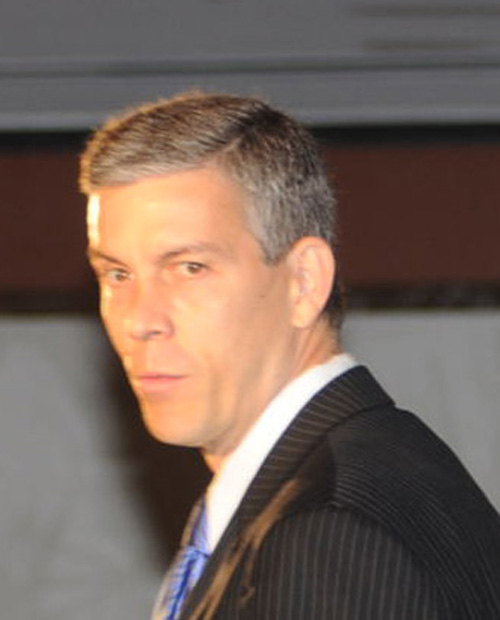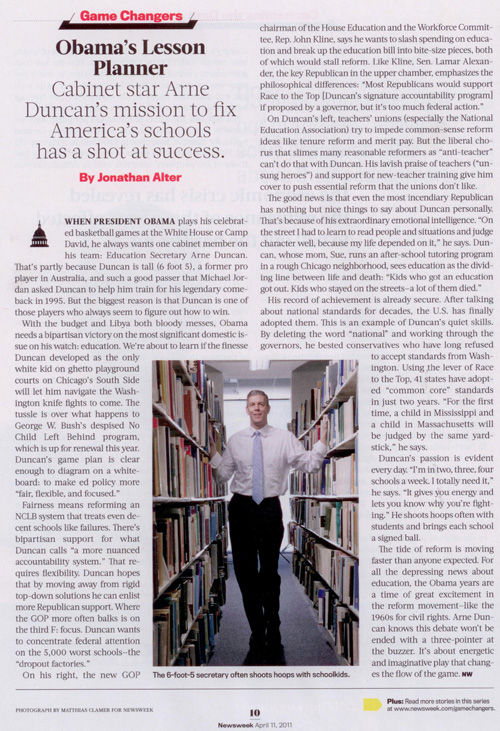MEDIA WATCH: Duncan continues obfuscations and outright lies in pushing corporate 'reforms' in Newark
[Thanks for Susan Ohanian for brining this to our attention here in Chicago. Former Chicago Public Schools Chief Executive Officer Arne Duncan, now U.S. Secretary of Education, continued his program of pushing half truths and outright lies on urban school systems in a recent interview with the editorial board of the Newark Star-Ledger newspaper (a paper I delivered for seven years when I lived in Linden, New Jersey as a child). The interview, published in full here, shows how most news organizations are still buying Arne's evasions, half truths, and outright lies as he pushes the massive privatization program he pioneered in Chicago on largely minority urban school districts across the USA.
 Most of the carefully scripted corporate school reform plan that Arne Duncan has been pushing for more than two years as U.S. Secretary of Education was outlined by Duncan in a June 19, 2009 speech before the corporate "school reform" group Advance Illinois in Chicago. Above, Duncan glares at a Substance reporter during the presentation of his plans for U.S. Education. That day, he promised to scapegoat the nation's 5,000 "worst" schools (as measured by standardized tests), ignore poverty (behind the smokescreen of the plea for the "urgency" of doing "something" immediately, and bust the unions (through a carefully orchestrated supposedly bipartisan attack on "bad teachers" protected by "tenure" and the unions). By continuing to allow Duncan's handlers to get away with the fabrications regarding the history of his work in Chicago (Duncan disrupted the lives of thousands of black children and scapegoated hundreds of black teachers and principals through "Renaissance 2010" school closings alone, making him the biggest terminator of African American educators since the Mississippi purges of the late 1940s and early 1950s), the nation's corporate media continue pushing other Duncan hoaxes, including his own personal narrative, which becomes less anchored to reality the farther Duncan gets from his privileged upbringing in Chicago's Hyde Park (University of Chicago, then Harvard) childhood. Substance photo by George N. Schmidt.In another time, Arne Duncan would long ago have been exposed as one of the biggest racists in the history of American public education, scapegoating black teachers and other teachers who remain trying to teach in the nation's increasingly large ghettos and barrios while the real problem is the corporate capitalist society which has relegated a growing number of children — most of them minorities — to poverty. As long as groups like the Star Ledger editors continue to allow Duncan to get away with his Great White Lies, the problem will continue. But as everyone who knows education can now see, to turn around Duncan's ending platitude, Duncan is the problem, not the solution. George N. Schmidt, Substance.]
Most of the carefully scripted corporate school reform plan that Arne Duncan has been pushing for more than two years as U.S. Secretary of Education was outlined by Duncan in a June 19, 2009 speech before the corporate "school reform" group Advance Illinois in Chicago. Above, Duncan glares at a Substance reporter during the presentation of his plans for U.S. Education. That day, he promised to scapegoat the nation's 5,000 "worst" schools (as measured by standardized tests), ignore poverty (behind the smokescreen of the plea for the "urgency" of doing "something" immediately, and bust the unions (through a carefully orchestrated supposedly bipartisan attack on "bad teachers" protected by "tenure" and the unions). By continuing to allow Duncan's handlers to get away with the fabrications regarding the history of his work in Chicago (Duncan disrupted the lives of thousands of black children and scapegoated hundreds of black teachers and principals through "Renaissance 2010" school closings alone, making him the biggest terminator of African American educators since the Mississippi purges of the late 1940s and early 1950s), the nation's corporate media continue pushing other Duncan hoaxes, including his own personal narrative, which becomes less anchored to reality the farther Duncan gets from his privileged upbringing in Chicago's Hyde Park (University of Chicago, then Harvard) childhood. Substance photo by George N. Schmidt.In another time, Arne Duncan would long ago have been exposed as one of the biggest racists in the history of American public education, scapegoating black teachers and other teachers who remain trying to teach in the nation's increasingly large ghettos and barrios while the real problem is the corporate capitalist society which has relegated a growing number of children — most of them minorities — to poverty. As long as groups like the Star Ledger editors continue to allow Duncan to get away with his Great White Lies, the problem will continue. But as everyone who knows education can now see, to turn around Duncan's ending platitude, Duncan is the problem, not the solution. George N. Schmidt, Substance.]
A Q&A with ... Arne Duncan: The eyes of America are on Newark’s school reform, Published: Sunday, April 03, 2011, 5:58 AM, By Star-Ledger Editorial Board Follow
The reform plan for Newark has support from President Obama and Gov. Chris Christie, both part of a rare but growing bipartisan coalition. They want to break down tenure protections, encourage charter schools, and hold the adults responsible for student performance. U.S. Education Secretary Arne Duncan discussed the moment in Newark with Editorial Page Editor Tom Moran. An edited transcript appears below.
Q. How significant is Newark’s reform effort for the nation?
A. It’s hugely important. It’s interesting because Newark hasn’t been underresourced. I ran Chicago schools and had about half the money Newark has, literally.
What’s been lacking is the courage to demand and expect excellence. And this is an amazing opportunity to break through that. Newark is a relatively small district, you have a strong mayor, a good partnership with the state, outside support and a steadfast commitment to get dramatically better. Newark has the potential to be a model. I feel a huge sense of urgency about this.
Q. Let me bounce off you three of the key concerns I’ve heard from those who are opposed to the reforms, or are skeptical. One: Charter schools are not dramatically lifting student performance, and they harm traditional schools by diverting money and active parents.
A. The data on charters is very clear. The highest-performing charters are a huge part of the solution. There are some in the middle, and there are some that are part of the problem. The key for Newark is to bring in more of the high-performing charters. There are some amazing players out there who can help. And at the end of the day, it’s a false argument against charters. These are public schools, public dollars, public school children and should be part of any reform.
 Newsweek magazine's April 11, 2011, edition contains more mendacious hagiography and nonsense about and by Arne Duncan. Pundit Jonathan Alter, who has been writing fan mail to corporate school reform for more than a decade and ignoring the failure of each successive stunt for which he has expressed his enthusiasm, is not enamoured of Arne Duncan. "The tide of reform is moving faster than anyone expected," Alter writes at the end of the piece above. "The Obama years are a time of great excietment in the reform movement, — like the 1960s for civil rights. Arne Duncan knows this debate won't be ended with a three-pointer at the buzzer. It's about energetic and imaginative play that changes the flow of the game."Q. A second concern: Reforming tenure is dangerous because student test scores do not provide an accurate measure of teacher performance.
Newsweek magazine's April 11, 2011, edition contains more mendacious hagiography and nonsense about and by Arne Duncan. Pundit Jonathan Alter, who has been writing fan mail to corporate school reform for more than a decade and ignoring the failure of each successive stunt for which he has expressed his enthusiasm, is not enamoured of Arne Duncan. "The tide of reform is moving faster than anyone expected," Alter writes at the end of the piece above. "The Obama years are a time of great excietment in the reform movement, — like the 1960s for civil rights. Arne Duncan knows this debate won't be ended with a three-pointer at the buzzer. It's about energetic and imaginative play that changes the flow of the game."Q. A second concern: Reforming tenure is dangerous because student test scores do not provide an accurate measure of teacher performance.
A. Linking student performance and teacher evaluation is hugely important. You have to look at multiple measures, as you do in any profession. But the issue we have is that teacher evaluation has been entirely divorced from student performance, as if that’s not relevant. To me, that demeans the profession. We haven’t rewarded great talent, supported those in the middle and moved out those at the bottom.
Q. So you’d use test scores as part of the evaluation, but look far beyond that?
A. Absolutely. And on tests, you have to focus on growth and gain to measure the improvement, not the absolute scores. You also look at peer evolutions, principal evaluations, a whole set of things.
Q. A third concern: Heavy philanthropy in Newark will allow outsiders to dictate what reforms take place.
A. Of course not. We always need resources to help fund innovations. But this isn’t about outsiders controlling anything. What is happening today is unacceptable, and we need to do much better, so we need all hands on deck. We have to ask more of parents, of teachers, of superintendents, of school boards and mayors. Where we can get philanthropic support, great. And support from churches and business. All hands on deck.
Q. In Washington, Mayor Adrian Fenty lost re-election after pushing a very similar reform program. What does that tell you?
A. You want strong mayoral leadership, and mayors have to stay close to the community. They have to be in the streets, in the schools and listening to parents. You can’t have a world-class city without a world-class school system. Mayors have to step up to the plate.
Q. You studied the nation’s worst 1,800 schools five years ago, and the worst 1,800 today. What did you find?
A. The majority of them got worse. This is why we put $4 billion behind grants, why we’ve challenged the country to work on the bottom 5 percent of schools. The country has been way too complacent, as though poor children can’t learn, that somehow it’s okay to have schools where 40 to 50 percent of the students drop out. I’m actually hopeful because there are so many high performing schools in poverty areas. We just need to take it to scale. This failure is not inevitable.
Q. What message would you offer to those who are worried about the changes coming to Newark?
A. What keeps me up at night is the historic lack of urgency, the acceptance of the status quo. We need to change. Anyone who is defending the status quo is part of the problem. And Newark has a unique opportunity now. Given its size, given the leadership from the top in (Cory) Booker and given the partnerships, Newark has a chance to leapfrog other places and lead the country. The goal in Newark is that in five years, not 10 years, it should be the best urban school system in the country.
This is not about incremental change. This has got to be about fundamental and dramatic change. And I’m very optimistic. The eyes of the country will be on Newark.


By: Parents sue foced charter move-in
DOE fakes data to do it
http://manhattan.ny1.com/content/top_stories/137121/upper-west-side-families-fight-charter-school-opening